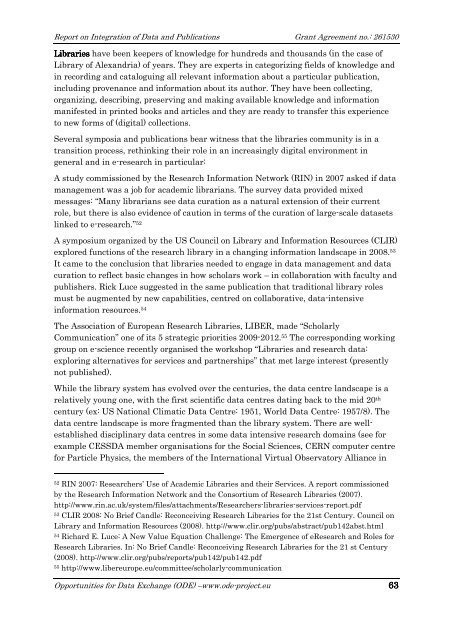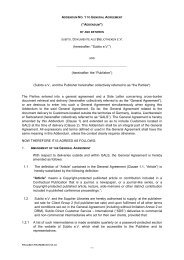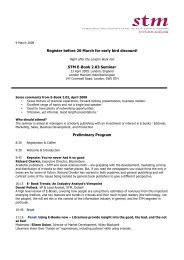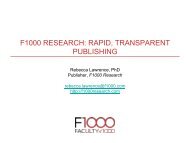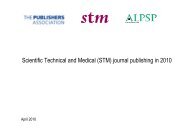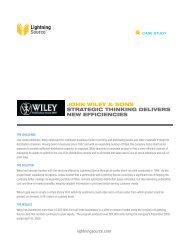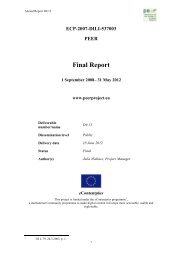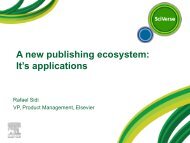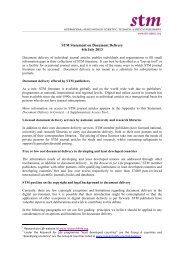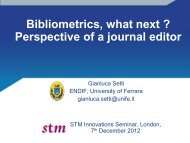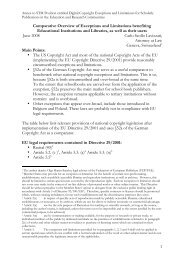Integration of Data and Publications - Alliance for Permanent Access
Integration of Data and Publications - Alliance for Permanent Access
Integration of Data and Publications - Alliance for Permanent Access
Create successful ePaper yourself
Turn your PDF publications into a flip-book with our unique Google optimized e-Paper software.
Report on <strong>Integration</strong> <strong>of</strong> <strong>Data</strong> <strong>and</strong> <strong>Publications</strong> Grant Agreement no.: 261530<br />
Libraries have been keepers <strong>of</strong> knowledge <strong>for</strong> hundreds <strong>and</strong> thous<strong>and</strong>s (in the case <strong>of</strong><br />
Library <strong>of</strong> Alex<strong>and</strong>ria) <strong>of</strong> years. They are experts in categorizing fields <strong>of</strong> knowledge <strong>and</strong><br />
in recording <strong>and</strong> cataloguing all relevant in<strong>for</strong>mation about a particular publication,<br />
including provenance <strong>and</strong> in<strong>for</strong>mation about its author. They have been collecting,<br />
organizing, describing, preserving <strong>and</strong> making available knowledge <strong>and</strong> in<strong>for</strong>mation<br />
manifested in printed books <strong>and</strong> articles <strong>and</strong> they are ready to transfer this experience<br />
to new <strong>for</strong>ms <strong>of</strong> (digital) collections.<br />
Several symposia <strong>and</strong> publications bear witness that the libraries community is in a<br />
transition process, rethinking their role in an increasingly digital environment in<br />
general <strong>and</strong> in e-research in particular:<br />
A study commissioned by the Research In<strong>for</strong>mation Network (RIN) in 2007 asked if data<br />
management was a job <strong>for</strong> academic librarians. The survey data provided mixed<br />
messages: “Many librarians see data curation as a natural extension <strong>of</strong> their current<br />
role, but there is also evidence <strong>of</strong> caution in terms <strong>of</strong> the curation <strong>of</strong> large-scale datasets<br />
linked to e-research.” 52<br />
A symposium organized by the US Council on Library <strong>and</strong> In<strong>for</strong>mation Resources (CLIR)<br />
explored functions <strong>of</strong> the research library in a changing in<strong>for</strong>mation l<strong>and</strong>scape in 2008. 53<br />
It came to the conclusion that libraries needed to engage in data management <strong>and</strong> data<br />
curation to reflect basic changes in how scholars work – in collaboration with faculty <strong>and</strong><br />
publishers. Rick Luce suggested in the same publication that traditional library roles<br />
must be augmented by new capabilities, centred on collaborative, data-intensive<br />
in<strong>for</strong>mation resources. 54<br />
The Association <strong>of</strong> European Research Libraries, LIBER, made “Scholarly<br />
Communication” one <strong>of</strong> its 5 strategic priorities 2009-2012. 55 The corresponding working<br />
group on e-science recently organised the workshop “Libraries <strong>and</strong> research data:<br />
exploring alternatives <strong>for</strong> services <strong>and</strong> partnerships” that met large interest (presently<br />
not published).<br />
While the library system has evolved over the centuries, the data centre l<strong>and</strong>scape is a<br />
relatively young one, with the first scientific data centres dating back to the mid 20 th<br />
century (ex: US National Climatic <strong>Data</strong> Centre: 1951, World <strong>Data</strong> Centre: 1957/8). The<br />
data centre l<strong>and</strong>scape is more fragmented than the library system. There are wellestablished<br />
disciplinary data centres in some data intensive research domains (see <strong>for</strong><br />
example CESSDA member organisations <strong>for</strong> the Social Sciences, CERN computer centre<br />
<strong>for</strong> Particle Physics, the members <strong>of</strong> the International Virtual Observatory <strong>Alliance</strong> in<br />
52 RIN 2007: Researchers’ Use <strong>of</strong> Academic Libraries <strong>and</strong> their Services. A report commissioned<br />
by the Research In<strong>for</strong>mation Network <strong>and</strong> the Consortium <strong>of</strong> Research Libraries (2007).<br />
http://www.rin.ac.uk/system/files/attachments/Researchers-libraries-services-report.pdf<br />
53 CLIR 2008: No Brief C<strong>and</strong>le: Reconceiving Research Libraries <strong>for</strong> the 21st Century. Council on<br />
Library <strong>and</strong> In<strong>for</strong>mation Resources (2008). http://www.clir.org/pubs/abstract/pub142abst.html<br />
54 Richard E. Luce: A New Value Equation Challenge: The Emergence <strong>of</strong> eResearch <strong>and</strong> Roles <strong>for</strong><br />
Research Libraries. In: No Brief C<strong>and</strong>le: Reconceiving Research Libraries <strong>for</strong> the 21 st Century<br />
(2008). http://www.clir.org/pubs/reports/pub142/pub142.pdf<br />
55 http://www.libereurope.eu/committee/scholarly-communication<br />
Opportunities <strong>for</strong> <strong>Data</strong> Exchange (ODE) –www.ode-project.eu 63


